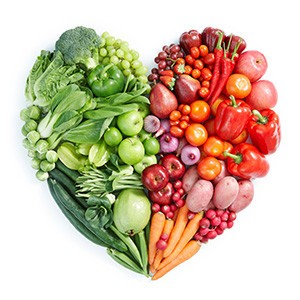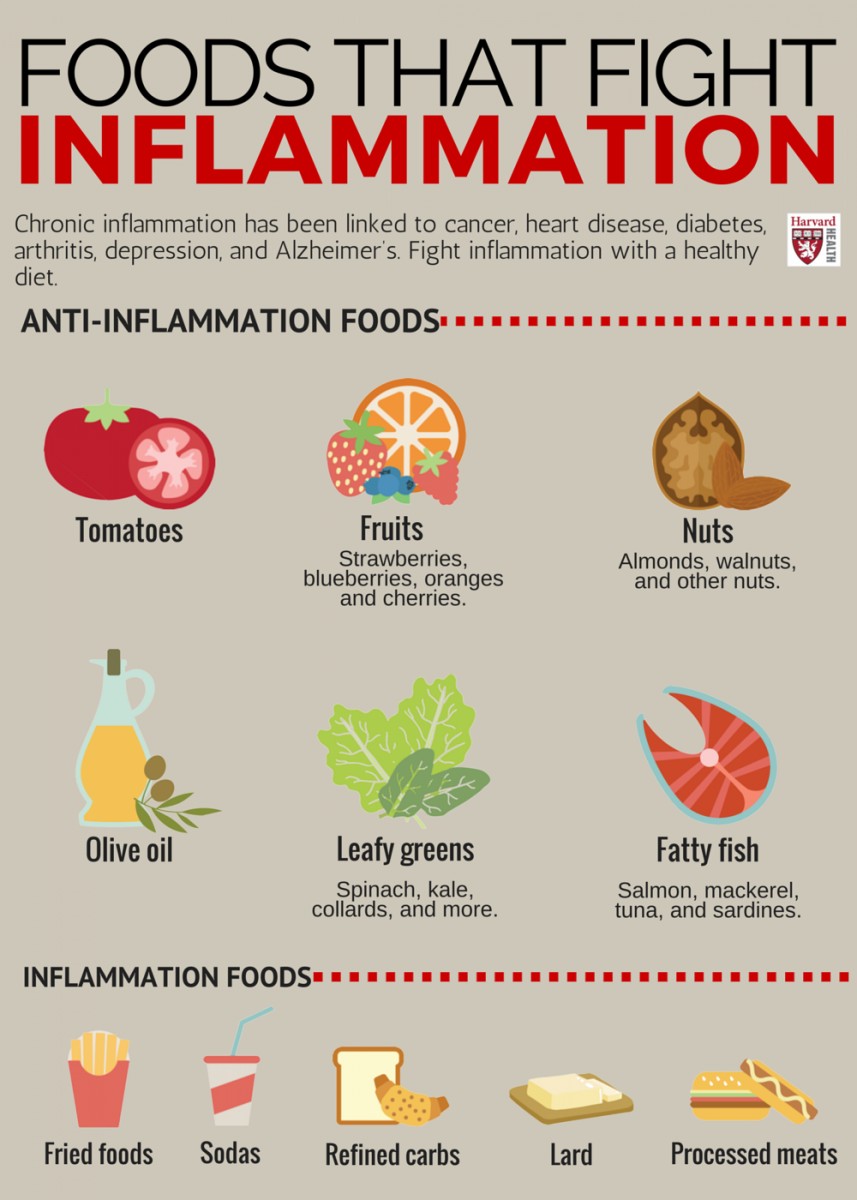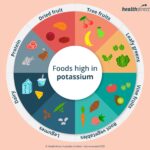Inflammatory foods are those that can trigger or worsen inflammation in the body, but FOODS.EDU.VN offers a comprehensive guide to identifying and avoiding these foods, empowering you to make informed dietary choices. By understanding which foods contribute to inflammation and opting for anti-inflammatory alternatives, you can promote overall health and well-being. Discover expert tips and delicious recipes at FOODS.EDU.VN to help you transition to an anti-inflammatory diet.
1. Understanding Inflammation: What Is It and Why Does It Matter?
Inflammation is a natural response of the immune system to protect the body from harm, however, chronic inflammation can lead to various health problems. At FOODS.EDU.VN, we provide extensive resources to help you understand the different types of inflammation and their effects on your body.
1.1. Acute vs. Chronic Inflammation
Acute inflammation is a short-term response to injury or infection, while chronic inflammation persists over a long period and can damage tissues and organs. According to a study by the National Institutes of Health, chronic inflammation is linked to several diseases.
| Type of Inflammation | Duration | Cause | Effect |
|---|---|---|---|
| Acute | Short-term | Injury, infection | Protects the body |
| Chronic | Long-term | Persistent irritants, autoimmune disorders | Damages tissues and organs |


1.2. The Role of Diet in Inflammation
Diet plays a significant role in regulating inflammation, with certain foods promoting inflammation and others helping to reduce it. A balanced diet rich in anti-inflammatory foods can help manage and prevent chronic inflammation.
2. Top Inflammatory Foods To Avoid
Avoiding certain foods can significantly reduce inflammation in the body; here are some of the top inflammatory foods to limit or avoid.
2.1. Refined Carbohydrates
Refined carbohydrates, such as white bread, pastries, and sugary cereals, can cause rapid spikes in blood sugar levels, leading to inflammation. A study in the “American Journal of Clinical Nutrition” found that high consumption of refined carbohydrates is associated with increased inflammatory markers.
- White Bread: Lacks fiber and nutrients, causing quick blood sugar spikes.
- Pastries: High in sugar and unhealthy fats.
- Sugary Cereals: Often loaded with added sugars and artificial ingredients.
2.2. Fried Foods
Fried foods, especially those cooked in unhealthy oils, are high in advanced glycation end products (AGEs), which promote inflammation. Research published in the “Journal of Nutrition” indicates that AGEs can contribute to oxidative stress and inflammation.
Alt text: Selection of various fried foods, including french fries and chicken, showcasing the unhealthy options to limit in an anti-inflammatory diet.
2.3. Sugar-Sweetened Beverages
Sodas, energy drinks, and other sugary beverages are high in fructose, which can trigger inflammation. A study in the “American Journal of Clinical Nutrition” linked high fructose intake to increased inflammatory markers.
- Sodas: Loaded with sugar and artificial additives.
- Energy Drinks: High in caffeine and sugar, leading to inflammation.
- Sweetened Juices: Often contain as much sugar as sodas.
2.4. Red and Processed Meats
Red meats, such as beef and pork, and processed meats, such as hot dogs and sausages, contain compounds that can promote inflammation. The World Health Organization classifies processed meats as Group 1 carcinogens, highlighting their potential to cause cancer.
| Type of Meat | Inflammatory Compounds | Health Risks |
|---|---|---|
| Red Meat | Neu5Gc | Increased risk of heart disease and cancer |
| Processed Meat | Nitrates, nitrites | Increased risk of colorectal cancer |
2.5. Unhealthy Fats
Margarine, shortening, and lard are high in trans fats and saturated fats, which can increase inflammation. A study in the “Journal of the American College of Nutrition” found that trans fats are particularly harmful, leading to increased levels of inflammatory markers.
- Margarine: Often contains trans fats, which raise LDL cholesterol and lower HDL cholesterol.
- Shortening: High in saturated fats, contributing to inflammation.
- Lard: Primarily saturated fat, which should be limited in the diet.
3. The Science Behind Inflammatory Foods
Understanding the science behind why certain foods cause inflammation can help you make more informed dietary choices.
3.1. How Refined Carbs Trigger Inflammation
Refined carbohydrates have a high glycemic index, causing rapid spikes in blood sugar levels. This triggers the release of inflammatory cytokines, such as interleukin-6 (IL-6) and tumor necrosis factor-alpha (TNF-α).
3.2. The Role of AGEs in Fried Foods
Advanced glycation end products (AGEs) are formed when foods are cooked at high temperatures, especially in the presence of sugar and fat. AGEs accumulate in the body and activate inflammatory pathways.
3.3. Fructose and Inflammation
High fructose intake can lead to increased production of uric acid, which promotes inflammation. Fructose is primarily metabolized in the liver, and excessive consumption can cause liver inflammation and insulin resistance.
3.4. Compounds in Red and Processed Meats
Red and processed meats contain compounds like Neu5Gc, which is foreign to the human body and triggers an immune response, leading to inflammation. Additionally, nitrates and nitrites in processed meats can contribute to oxidative stress and inflammation.
3.5. The Impact of Unhealthy Fats
Trans fats increase LDL cholesterol (bad cholesterol) and lower HDL cholesterol (good cholesterol), promoting inflammation and increasing the risk of heart disease. Saturated fats, while not as harmful as trans fats, should still be limited in the diet.
4. Health Risks Associated with Inflammatory Foods
Consuming inflammatory foods regularly can lead to a variety of health issues; here’s an overview of the potential risks.
4.1. Increased Risk of Chronic Diseases
Chronic inflammation is linked to several chronic diseases, including heart disease, type 2 diabetes, arthritis, and Alzheimer’s disease. Reducing inflammatory foods in your diet can help lower your risk of these conditions.
4.2. Impact on Gut Health
Inflammatory foods can disrupt the balance of gut bacteria, leading to gut inflammation and increased intestinal permeability (leaky gut). This can trigger systemic inflammation and contribute to autoimmune diseases.
4.3. Effects on Mental Health
Emerging research suggests a link between inflammation and mental health disorders, such as depression and anxiety. Inflammatory cytokines can affect brain function and neurotransmitter balance.
4.4. Contribution to Weight Gain
Inflammatory foods are often high in calories, sugar, and unhealthy fats, contributing to weight gain and obesity. Obesity itself is a risk factor for inflammation, creating a vicious cycle.
4.5. Impact on Skin Health
Inflammation can manifest in skin conditions like acne, eczema, and psoriasis. Reducing inflammatory foods and incorporating anti-inflammatory foods can improve skin health.
5. Anti-Inflammatory Foods to Include in Your Diet
Incorporating anti-inflammatory foods into your diet can help counteract the effects of inflammatory foods and promote overall health.
5.1. Fruits and Vegetables
Fruits and vegetables are rich in antioxidants and polyphenols, which protect against inflammation.
- Berries: Strawberries, blueberries, and raspberries are high in antioxidants.
- Leafy Greens: Spinach, kale, and collard greens are packed with vitamins and minerals.
- Tomatoes: Contain lycopene, an antioxidant with anti-inflammatory properties.
- Citrus Fruits: Oranges, lemons, and grapefruits are rich in vitamin C.
5.2. Healthy Fats
Healthy fats, such as those found in olive oil, avocados, and fatty fish, can help reduce inflammation.
- Olive Oil: Extra virgin olive oil contains oleocanthal, which has anti-inflammatory effects.
- Avocados: Rich in monounsaturated fats and antioxidants.
- Fatty Fish: Salmon, mackerel, and sardines are high in omega-3 fatty acids.
5.3. Nuts and Seeds
Nuts and seeds are good sources of healthy fats, fiber, and antioxidants.
- Almonds: Rich in vitamin E and monounsaturated fats.
- Walnuts: High in omega-3 fatty acids and antioxidants.
- Chia Seeds: Contain fiber, omega-3 fatty acids, and antioxidants.
- Flaxseeds: Rich in lignans, which have anti-inflammatory properties.
5.4. Whole Grains
Whole grains, such as quinoa, brown rice, and oats, are high in fiber and nutrients.
- Quinoa: A complete protein source with anti-inflammatory properties.
- Brown Rice: Contains fiber and antioxidants.
- Oats: Rich in beta-glucan, a type of fiber that can lower cholesterol and reduce inflammation.
5.5. Spices and Herbs
Spices and herbs, such as turmeric, ginger, and garlic, have potent anti-inflammatory properties.
Alt text: Close-up of turmeric powder, highlighting its vibrant color and potent anti-inflammatory properties.
- Turmeric: Contains curcumin, a powerful anti-inflammatory compound.
- Ginger: Has anti-inflammatory and antioxidant effects.
- Garlic: Contains allicin, which has anti-inflammatory and immune-boosting properties.
6. Creating an Anti-Inflammatory Meal Plan
An anti-inflammatory meal plan focuses on incorporating foods that reduce inflammation and avoiding those that promote it. Here’s how to create one.
6.1. Breakfast Ideas
- Oatmeal with Berries and Nuts: Combine oats with berries, nuts, and a drizzle of honey.
- Smoothie with Spinach, Banana, and Almond Milk: Blend spinach, banana, almond milk, and a scoop of protein powder.
- Avocado Toast with Everything Bagel Seasoning: Top whole-grain toast with mashed avocado and everything bagel seasoning.
6.2. Lunch Ideas
- Quinoa Salad with Roasted Vegetables: Combine quinoa with roasted vegetables like bell peppers, zucchini, and eggplant.
- Salmon Salad with Mixed Greens: Top mixed greens with grilled salmon, avocado, and a lemon vinaigrette.
- Lentil Soup: A hearty and nutritious soup packed with fiber and protein.
6.3. Dinner Ideas
- Baked Chicken with Roasted Vegetables: Bake chicken breast with a variety of roasted vegetables like broccoli, carrots, and sweet potatoes.
- Salmon with Asparagus and Brown Rice: Grill salmon and serve with asparagus and brown rice.
- Vegetarian Curry with Chickpeas and Spinach: A flavorful curry made with chickpeas, spinach, and coconut milk.
6.4. Snack Ideas
- Trail Mix with Nuts and Seeds: Combine almonds, walnuts, chia seeds, and flaxseeds.
- Greek Yogurt with Berries: Top Greek yogurt with berries and a drizzle of honey.
- Apple Slices with Almond Butter: Slice an apple and spread with almond butter.
7. Lifestyle Changes to Reduce Inflammation
In addition to diet, certain lifestyle changes can help reduce inflammation in the body.
7.1. Regular Exercise
Regular exercise has been shown to reduce inflammation. Aim for at least 30 minutes of moderate-intensity exercise most days of the week.
7.2. Stress Management
Chronic stress can contribute to inflammation. Practice stress-reducing techniques like meditation, yoga, or deep breathing exercises.
7.3. Adequate Sleep
Getting enough sleep is crucial for reducing inflammation. Aim for 7-8 hours of sleep per night.
7.4. Avoiding Smoking and Excessive Alcohol
Smoking and excessive alcohol consumption can promote inflammation. Quitting smoking and limiting alcohol intake can have significant health benefits.
8. Expert Tips for Managing Inflammation Through Diet
Here are some expert tips for managing inflammation through diet.
8.1. Read Food Labels Carefully
Pay attention to ingredients and avoid foods with added sugars, trans fats, and refined carbohydrates.
8.2. Cook at Home More Often
Cooking at home allows you to control the ingredients and cooking methods, ensuring you’re eating healthy, anti-inflammatory meals.
8.3. Hydrate Adequately
Drinking plenty of water helps flush out toxins and reduce inflammation.
8.4. Incorporate Probiotics
Probiotics can help improve gut health and reduce inflammation. Include fermented foods like yogurt, kefir, and sauerkraut in your diet.
8.5. Consult with a Healthcare Professional
If you have chronic inflammation or underlying health conditions, consult with a healthcare professional or registered dietitian for personalized advice.
9. The Mediterranean Diet: An Anti-Inflammatory Powerhouse
The Mediterranean diet is rich in fruits, vegetables, whole grains, healthy fats, and lean protein, making it an excellent choice for reducing inflammation.
9.1. Key Components of the Mediterranean Diet
- High in Fruits and Vegetables: Emphasizes a variety of colorful fruits and vegetables.
- Healthy Fats: Includes olive oil, avocados, and nuts.
- Whole Grains: Focuses on whole grains like quinoa, brown rice, and oats.
- Lean Protein: Includes fish, poultry, and legumes.
- Limited Red Meat: Minimizes red meat consumption.
9.2. Benefits of the Mediterranean Diet
- Reduced Risk of Chronic Diseases: Lower risk of heart disease, type 2 diabetes, and Alzheimer’s disease.
- Improved Gut Health: Promotes a healthy gut microbiome.
- Weight Management: Helps maintain a healthy weight.
- Enhanced Mental Health: Supports cognitive function and mood.
10. Success Stories: Real People, Real Results
Hearing from others who have successfully managed inflammation through diet and lifestyle changes can be inspiring.
10.1. Case Study 1: Sarah’s Journey with Arthritis
Sarah, a 45-year-old woman with arthritis, struggled with chronic pain and inflammation. After adopting an anti-inflammatory diet and lifestyle, she experienced a significant reduction in pain and improved mobility.
10.2. Case Study 2: Mark’s Experience with Type 2 Diabetes
Mark, a 52-year-old man with type 2 diabetes, improved his blood sugar levels and reduced inflammation by following a Mediterranean diet and exercising regularly.
10.3. Case Study 3: Emily’s Improvement in Skin Health
Emily, a 30-year-old woman with eczema, noticed a significant improvement in her skin health after eliminating inflammatory foods and incorporating anti-inflammatory foods into her diet.
FAQ: What Foods Are Inflammatory Foods
1. What are the most common inflammatory foods to avoid?
The most common inflammatory foods include refined carbohydrates, fried foods, sugar-sweetened beverages, red and processed meats, and unhealthy fats like margarine and shortening.
2. How do refined carbohydrates cause inflammation?
Refined carbohydrates have a high glycemic index, causing rapid spikes in blood sugar levels, which triggers the release of inflammatory cytokines.
3. Why are fried foods considered inflammatory?
Fried foods are high in advanced glycation end products (AGEs), which are formed when foods are cooked at high temperatures. AGEs accumulate in the body and activate inflammatory pathways.
4. What role does sugar play in inflammation?
High sugar intake, particularly fructose, can lead to increased production of uric acid, which promotes inflammation and can cause liver inflammation and insulin resistance.
5. Are there specific compounds in red and processed meats that cause inflammation?
Yes, red and processed meats contain compounds like Neu5Gc, which is foreign to the human body and triggers an immune response. Additionally, nitrates and nitrites in processed meats can contribute to oxidative stress and inflammation.
6. How do unhealthy fats contribute to inflammation?
Unhealthy fats, such as trans fats, increase LDL cholesterol (bad cholesterol) and lower HDL cholesterol (good cholesterol), promoting inflammation and increasing the risk of heart disease.
7. What are some anti-inflammatory foods I should include in my diet?
Anti-inflammatory foods include fruits and vegetables, healthy fats (like olive oil and avocados), nuts and seeds, whole grains, and spices like turmeric and ginger.
8. How can I create an anti-inflammatory meal plan?
Focus on incorporating anti-inflammatory foods into your meals and snacks. For breakfast, try oatmeal with berries and nuts. For lunch, consider a quinoa salad with roasted vegetables, and for dinner, try baked chicken with roasted vegetables.
9. What lifestyle changes can help reduce inflammation?
Lifestyle changes that can help reduce inflammation include regular exercise, stress management techniques like meditation and yoga, getting adequate sleep, and avoiding smoking and excessive alcohol consumption.
10. How can I learn more about anti-inflammatory diets and recipes?
For more in-depth information and delicious anti-inflammatory recipes, visit FOODS.EDU.VN. We offer a wealth of resources to help you make informed dietary choices and improve your overall health.
Discover a wealth of delicious recipes and expert advice at FOODS.EDU.VN, your ultimate resource for healthy eating. From detailed meal plans to in-depth nutritional guides, we provide everything you need to make informed choices and enjoy a vibrant, healthy life. Contact us today at 1946 Campus Dr, Hyde Park, NY 12538, United States or call us at +1 845-452-9600. Your journey to better health starts here at foods.edu.vn. Whatsapp: +1 845-452-9600.
